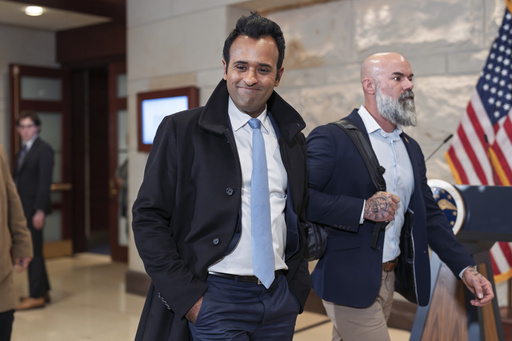WEST PALM BEACH, Fla. — A clash among supporters of Donald Trump regarding immigration policies and the tech sector is exposing fractures within his political base, shedding light on the potential complexities and conflicting perspectives his coalition could face if he returns to the White House.
The discord reveals the divide between influential tech figures, including billionaire Elon Musk and entrepreneur Vivek Ramaswamy, who advocate for an influx of highly skilled foreign workers, and the Make America Great Again (MAGA) supporters who uphold Trump’s tough immigration stance. This debate began when Laura Loomer, a controversial right-wing figure known for her inflammatory remarks, criticized Trump’s appointment of Sriram Krishnan as his advisor on artificial intelligence policy. Krishnan supports increased opportunities for skilled immigrants in the U.S.
Loomer claimed that this stance contradicts the “America First” philosophy, accusing the tech leaders aligning with Trump of seeking personal gain. The discourse primarily unfolded on X, the social media platform owned by Musk.
Following Loomer’s comments, venture capitalist David Sacks, who has been designated by Trump as the “White House A.I. & Crypto Czar,” engaged in an exchange defending the need for foreign talent in the tech sector. Both Musk and Ramaswamy expressed opinions emphasizing the necessity for the industry to hire such workers, fueling a broader conversation among right-wing figures regarding the need for American labor, the core values of American culture, the role of tech entrepreneurs within Trump’s circle, and the fundamental ethos of his political movement.
Up until this point, Trump has not publicly addressed the ongoing disagreement among his supporters. His transition team refrained from commenting on his views regarding visas for skilled workers or the online discourse. Instead, they referenced a past speech from Trump, delivered at Mount Rushmore in 2020, that highlighted historical American figures and principles while sharing a link to a post from Stephen Miller, a veteran advisor known for his stringent immigration policies.
Musk, as the wealthiest individual globally and a prominent ally to the president-elect, played a crucial role in this discussion. His influence, coupled with his supportive stance on hiring foreign workers, positioned him at the center of the controversy. Tech companies assert that H-1B visas, which allow skilled workers into the country, are essential for filling demanding roles, whereas critics argue that such policies harm American job seekers. Some factions on the right are advocating for the termination of the H-1B program rather than its expansion.
Having previously been on an H-1B visa himself, Musk defended the industry’s reliance on international talent, stating, “There is a permanent shortage of excellent engineering talent. It is the fundamental limiting factor in Silicon Valley.”
Trump’s stance on immigration has historically illustrated this rift within his movement. His formidable immigration policies, which included a commitment to mass deportations, were foundational to his success in the 2016 presidential race. While he concentrated on undocumented immigrants, he also sought to impose restrictions on legal immigration avenues, such as family-based visas. Back in 2016, he labeled the H-1B visa program as “very bad” for American workers; later, as president, he issued an executive order in 2017 promoting “Buy American and Hire American,” which aimed to prioritize the highest-skilled applicants for H-1B visas.
Nonetheless, Trump’s businesses have employed foreign workers, including positions at his Mar-a-Lago estate and his social media company, which has utilized the H-1B program for skilled positions.
As he campaigns for a return to the presidency in 2024, Trump has made immigration a cornerstone of his platform, framing undocumented immigrants as a threat to American society and vowing to facilitate the largest deportation effort in history. However, he made a surprising pivot during a podcast appearance this year, proposing automatic green cards for foreign graduates of U.S. universities. “I think you should get automatically, as part of your diploma, a green card to be able to stay in this country,” he expressed on the “All-In” podcast, where he engaged with individuals from the tech and venture capital sectors.
These remarks coincided with Trump’s emerging connections within the tech arena, yet he has not consistently integrated this viewpoint into his campaign narrative or specified any plans to advance this approach.




